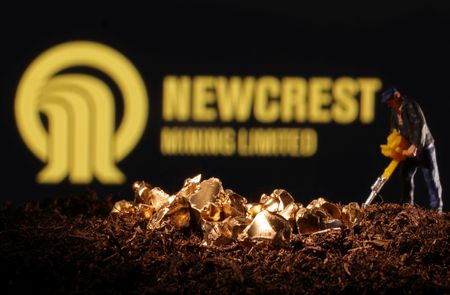 1
1 1
1

By Melanie Burton, Scott Murdoch and Divya Rajagopal
(Reuters) -U.S.-based Newmont Corp’s $16.9 billion offer for Newcrest Mining Ltd would create a gold mining behemoth, but investors and analysts said the offer may be too low in the wake of a leadership change at the Australian company.
Already the world’s largest gold producer by market value and ounces produced, Newmont would produce nearly twice as much of the yellow metal as rival Barrick Gold Corp if the Newcrest deal went through. The offer, however, reinforces long-standing fears that gold acquisitions destroy rather than create shareholder value.
Shares of Newmont were trading more than 5% lower at $47.30 on Monday afternoon. Analysts at Jefferies cut their target on Denver-based Newmont by 12% to $50 on the prospects of a bidding war.
Flossbach von Storch, the Germany-based asset manager and Newmont’s eighth-largest shareholder, said the two companies would fit well together but that it was not in favor of Newmont increasing its bid.
“We don’t want to see big premiums paid,” Simon Jäger, investment manager at Flossbach von Storch, told Reuters, adding he expects a “disciplined” approach towards M&A from Newmont.
Newcrest is seeking a replacement for former Chief Executive Officer Sandeep Biswas, who stepped down in December. In the meantime, the outlook for gold prices is improving on expectations that global interest rates will peak this year and then turn down.
If successful, the all-share deal would be the largest mining takeover and the third-largest corporate buyout in Australian history, according to Refinitiv data.
Newcrest, which was spun out of Newmont in the 1990s, has said it is considering the proposal. Newmont described the combination as “a powerful value proposition” but has said little else publicly. The company’s executives on Monday told an investor, who declined to be identified, they do not expect to make a hostile bid for Newcrest and that they expect the deal to close on friendly terms.
The initial feedback from Newcrest shareholders, though, is that they want a higher price, according to a person familiar with Newcrest’s deliberations.
“A good litmus test for a reasonably-priced deal is one where both seller and buyer feel somewhat aggrieved by selling out too low or by paying too much,” said Simon Mawhinney, chief investment officer at Allan Gray, Newcrest’s largest shareholder with a 7.4% stake. “It’s not clear to me that this kind of symmetry exists with these deal terms.”
Newcrest shares surged on Monday as much as 14.4% to A$25.60, the highest since May 2022, but remained below the implied offer price of $27.16. Shares closed 9.3% higher at A$24.53.
“We think Newcrest is now in play, but if a deal is to be done, it will likely need to be at a higher price,” Morningstar analyst Jon Mills wrote in a note to clients.
The indicative offer implies a 21% premium to Newcrest’s share price before the bid was announced, materially below the traditional 30% takeover premium, said Mills, who values Newcrest at about A$31 per share.
Newcrest’s operations include its top-class Cadia asset in Australia, an expanding footprint in North America and Papua New Guinea, and growth potential in copper, highly prized as key to the world’s energy transition.
Newcrest shareholders would receive 0.38 Newmont shares for every Newcrest share, giving them a 30% stake in the enlarged miner. It is a 4.7% improvement from a previous offer that was rejected for not providing enough value, Newcrest disclosed on Monday.
Newmont itself fended off an $18 billion hostile bid from Barrick in 2019.
LEADERSHIP TURNOVER
Newcrest is expected to announce a new CEO this year after Biswas announced his retirement after eight years.
Sherry Duhe, who joined Newcrest in February 2022 and had served as its chief financial officer, is the interim CEO while a global internal and external search for a replacement is underway.
Newcrest has been viewed as a target in recent years given its middling performance, but only a handful of buyers are big enough to take it out, said an investment banker who was not authorized to speak publicly about the matter.
The all-share nature of the offer meant the timing is more likely to be linked to Newcrest’s leadership vulnerability than a big call on the gold price, but it probably also reflects a constructive view on the precious metal, the banker added.
Sibanye-Stillwater Ltd CEO Neal Froneman told Reuters on Monday he was not interested in bidding for a gold company and would focus on building a “geographically diverse green metals company.”
Gold prices fell to two-and-a-half-year lows around $1,615 an ounce last autumn as rising interest rates pushed up bond yields and strengthened the dollar, making gold less attractive to investors.
Prices have since recovered to around $1,850 as markets anticipate the end of rate increases, but most analysts expect gold price gains to be limited while borrowing costs remain high.
(Reporting by Melanie Burton in Melbourne, Scott Murdoch in Sydney and Divya Rajagopal in Toronto; additional reporting by Sameer Manekar in Bengaluru, Helen Reid in Cape Town and Peter Hobson in London; Editing by Lisa Shumaker, Jamie Freed, Ernest Scheyder, Paul Simao and Marguerita Choy)